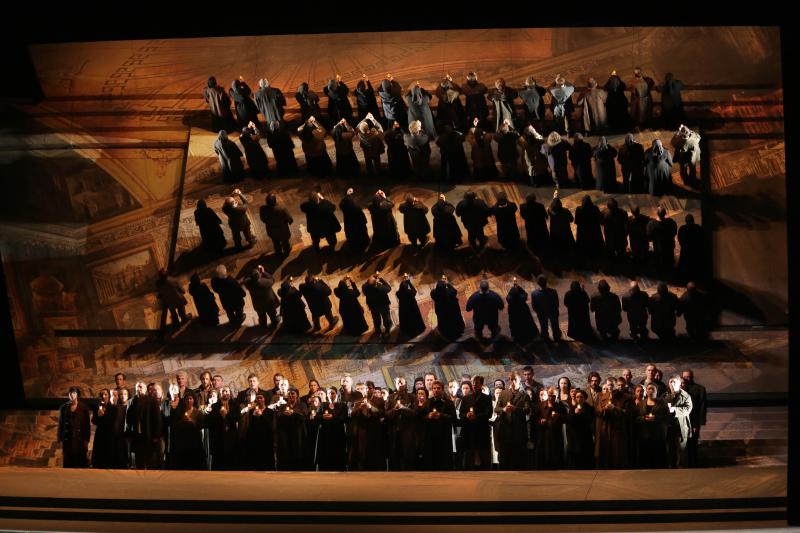Showing @ Festival Theatre, Edinburgh, until Sat 30 Aug (run ended)
Les Troyens was considered un-performable in its whole when it was first presented in 19th Century Paris. Berlioz wanted to create something truly epic; something that showed his obsession with the Aeneid to its fullest extent, and which could keep pace with Virgil and Shakespeare. The Mariinsky Opera give a good stab at realising his vision, but the best of intentions can’t disguise a work that fails to live up to its own expectations.
The most bizarre aspect of the cuts previously judged necessary is that the scenes omitted were always the opening Trojan setting – and these are stunning. The brief joy of a long-besieged people, constantly undermined by Cassandra’s doomed mutterings, is beautifully evoked by the breathtaking staging. A clever mirror doubles the cityscape, showing Troy both on the ground and in the heavens; it multiplies the already large chorus on stage, as black-clothed Trojans swarm across their city like ants.
It seems as though the destruction of Troy’s royalty will take up the rest of the action, with the cruel weight of history the central theme – but Berlioz doesn’t linger in the chaos. Instead, he moves on to the well-trodden journey of Aeneas, abandoning a potentially rich tapestry of Trojan characters. We are introduced to Priam, Hecuba, Andromache for one short scene before they disappear off-stage, never to sing a line.
The set follows this downward trajectory in the middle acts; the ravaged and ancient city is replaced by the clean, white, rather boring woods of Carthage. This blandness is echoed in the music, which becomes dull, even turgid at times. The plot falters – little time is spent exploring the relationship between Dido and Aeneas, which lessens the impact of the inevitable betrayal. A more dynamic final act redeems proceedings somewhat, and the performances – particularly those in the parts of Cassandra and Dido – are committed and full of passion. But with the show’s glossy programme asserting that Les Troyens stands shoulder-to-shoulder with Tristan und Isolde and Otello, the comparison just doesn’t bear weight.
Showing as part of the Edinburgh International Festival 2014
